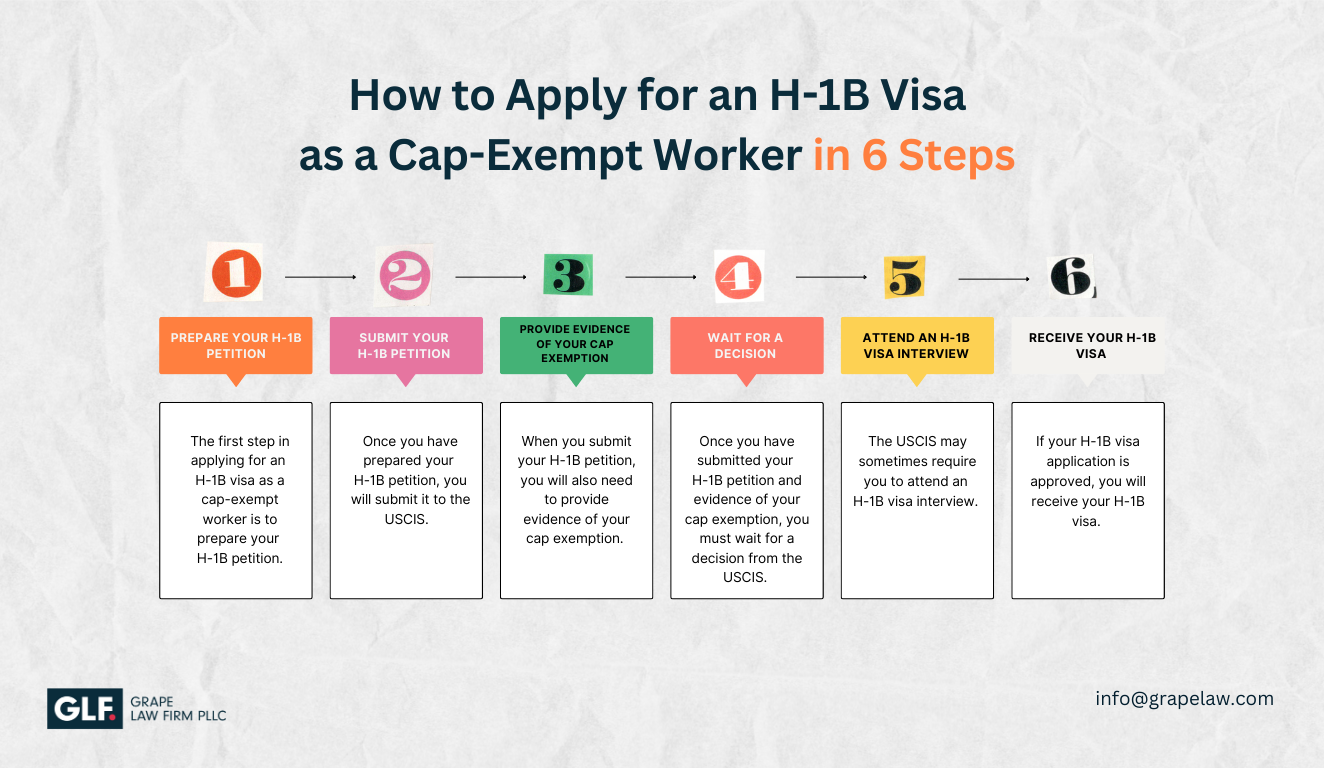The H1B non-immigrant work visa program is highly sought-after for foreign workers seeking to work in the United States. The H1B non-immigrant work visa allows foreign workers in specialty occupations to work in the U.S. for up to three years, with the option to extend for another three years.
However, the H-1B non-immigrant work visa program is subject to an annual cap, which limits the number of visas available each fiscal year. The cap for the fiscal year 2023 is set at 85,000 visas, with 20,000 of these visas set aside for exempt organizations, institutions of higher education, and related or affiliated non-profits.
In this article, we will explain who qualifies for an H-1B cap exemption and how to apply for an H-1B visa as a cap-exempt worker.
What is H-1B Cap-Exempt
This category applies to those seeking employment in an exempt organization, an institution of higher education, or a related or affiliated non-profit entity. For example, if the petitioner seeks an H-1B visa for a faculty position at a university or educational institute, they would be considered cap-exempt. Additionally, any positions under the tenure system at a university would also qualify for this exemption.
But what about workers who are exempt from the H-1B cap?
If you are a foreign worker who qualifies for an H-1B cap exemption, you may bypass the annual cap and receive an H-1B visa without waiting for the annual lottery. This can significantly reduce the time and uncertainty of obtaining an H-1B visa.
Who Qualifies for an H-1B Cap Exemption?
Several categories are exempt from the H-1B cap. These categories include:
Workers Employed at Cap-Exempt Institutions
If a cap-exempt institution employs you, you may be eligible for an H-1B cap exemption. Cap-exempt institutions include:
- Universities,
- Affiliated non-profit organizations,
- Government research organizations,
- Primary and secondary schools.
This category of H-1B cap exemption provides an advantage for foreign workers who have received their education in the U.S. and who now seek to work in the U.S. in their field of study.
Workers Who Have Already Been Counted Against The H-1B Cap in The Past Six Years
If you have already received an H-1B visa in the past six years, you may be eligible for an H-1B cap exemption. This is because each time you receive an H-1B visa, you are counted against the annual cap.
Workers Who are Applying for a Concurrent H-1B Visa
If you currently work in the U.S. on an H-1B visa and are applying for a concurrent H-1B visa, you may be eligible for an H-1B cap exemption. This is because you are already counted against the annual cap.
How to Apply for an H-1B Visa as a Cap-Exempt Worker

Applying for an H-1B non-immigrant work visa as a cap-exempt worker is similar to applying for an H-1B visa under the annual cap. However, there are a few key differences that you should be aware of.
Prepare Your H-1B Petition
The first step in applying for an H-1B visa as a cap-exempt worker is to prepare your H-1B petition. This will include submitting the necessary forms and documentation to the U.S. Citizenship and Immigration Services (USCIS). Your employer or attorney will typically assist you with preparing the H-1B visa petition.
The petitioner must provide proof of the organization's exempt status when filing this petition. The following documents should be included when submitting a petition:
- Form I-129, Petition for Nonimmigrant Worker,
- Official letter from school or employer verifying exempt status/tax exemption (for universities) or Exemption Number (for non-profits),
- Supporting documents and evidence, including resumes and proof of credentials.
Additionally, employers must include additional documents for any foreign nationals exempt from the cap under a blanket petition.
Submit Your H-1B Petition
Once you have prepared your H-1B petition, you will submit it to the USCIS. Therefore, ensuring that all forms and documentation are complete and accurate is significant, as any errors or omissions may delay or deny your H-1B visa application.
Provide Evidence of Your Cap Exemption
When you submit your H-1B petition, you will also need to provide evidence of your cap exemption. This may include a letter from your employer confirming that you are employed by a cap-exempt institution or a copy of your previous H-1B visa if you are switching from another visa category.
Wait for a Decision
Once you have submitted your H-1B petition and evidence of your cap exemption, you must wait for a decision from the USCIS. The processing time for H-1B visas varies, but it is typically several months. You can check the status of your H-1B visa application online.
Attend an H-1B Visa Interview (If required)
You may be required to attend an H-1B visa interview. This is typically a brief meeting with a consular officer to verify your H-1B petition's information and confirm that you are eligible for an H-1B visa.
Receive Your H-1B Visa
If your H-1B visa application is approved, you will receive your H-1B visa. This will allow you to enter the U.S. and start working in your specialty occupation.
Tips & Advice on Filing a Successful Application
It's crucial to understand the requirements of each H-1B Visa Cap Exemption to submit a successful petition. Here are some tips and advice for an outstanding petition:
- Employers should submit relevant documentation, such as tax information and employment records, including job titles, duties, and salary rates.
- Foreign nationals should provide evidence that details their qualifications and education.
- Employers should complete all forms accurately to maximize the chance of approval.
In conclusion, H-1B cap exemptions provide a significant advantage for foreign workers seeking to work in the U.S. By bypassing the annual cap, cap-exempt workers may obtain an H-1B visa more quickly and with less uncertainty.
If you qualify for an H-1B cap exemption. In that case, it is essential to consult with an experienced immigration attorney who can assist you with the H-1B visa process.
Get Legal Consultancy from Grape Law
At Grape Law, our experienced immigration attorneys are dedicated to helping foreign workers navigate the complex H-1B non-immigrant work visa process. Whether you are a cap-exempt worker or subject to the annual cap, we can assist you with preparing and submitting your H-1B petition, attending an H-1B visa interview, and addressing any issues that may arise during the H-1B visa process.
Contact us today to schedule a consultation and learn more about how we can help you achieve your immigration goals.
